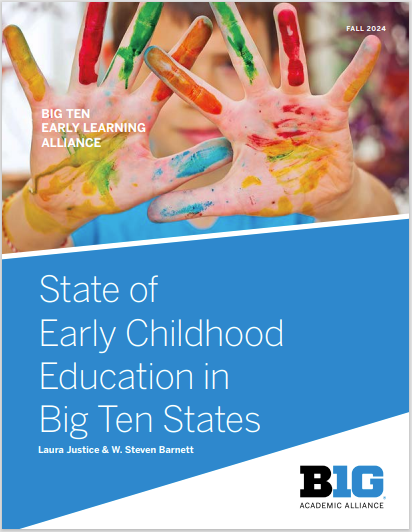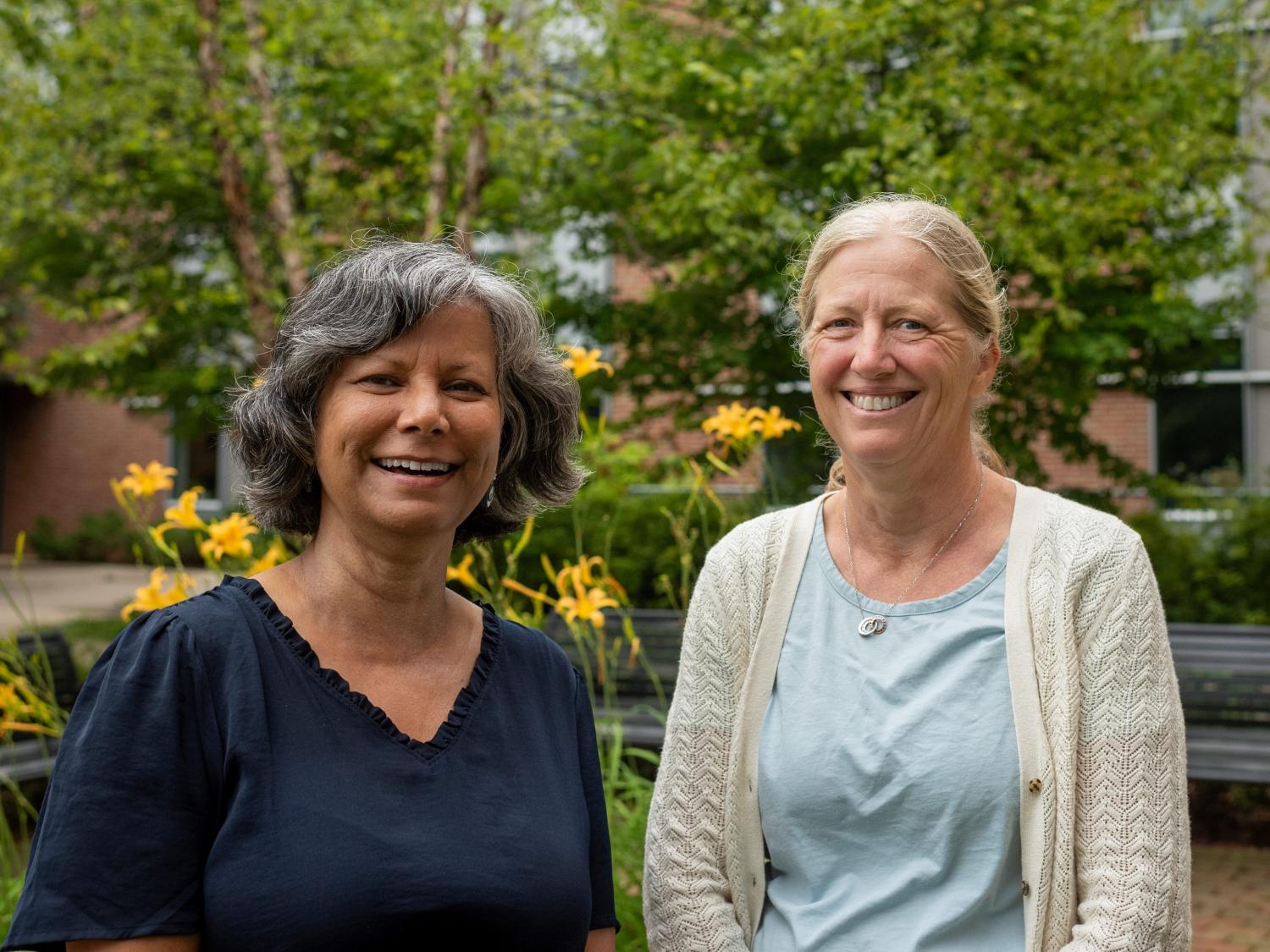Latest News
The National Academy of Kinesiology recently announced their 2025 fellows.

"The current exploratory analysis is focused on a follow-up survey that was added post-hoc to examine potential long-term effects of the Play With Me intervention on middle childhood weight outcomes approximately two years post-intervention."

The purpose of the fellowship programs is to provide researchers with immersive opportunities to learn about policy development, implementation, and evaluation, and to use their research skills in child development to inform public policy at the federal or state level.

Low-income students who received a preschool intervention focused on social-emotional development continued to benefit from it during their teen years according to a recent study published in the journal Child Development.

"My interdisciplinary interests in human biological processes and behavior ultimately drew me to developmental science, as it offers a unique lens to examine the complex interplay between individual functioning, family and neighborhood contexts, and bioregulatory processes across time."

"The purpose of this article is to describe the conceptualization, methodological considerations, and decision-making processes involved in selecting specific constructs and measures under the broad umbrella of 'child behavior and caregiver-child interaction' for HBCD."

This study advances current literature by clarifying the role of frontal EEG asymmetry and delta-beta coupling in the link between behavioral inhibition and various presentations of social anxiety symptoms during adolescence.

Several members of the Penn State liberal arts family were honored during the College of the Liberal Arts’ annual alumni awards ceremony on Thursday, May 1 at the Nittany Lion Inn.

The following individuals received tenure-line and non-tenure-line academic promotions.

Findings from this study indicate that parenting may benefit the most when both the maternal sleep–wake system and coparenting system provide support and might be
most compromised when both systems produce stress.

"Findings highlight the ways in which child behavior impacts caregiving environmental risk and have implications for identifying and intervening with early childhood aggression and the contexts in which it occurs."

Penn State University Libraries presented its eighth annual Undergraduate Research Award: Excellence in Information Literacy honors at the end of the spring 2025 semester to 104 students at 20 undergraduate Penn State campuses.

We Are Connected is designed to teach students important skills related to handling conflict, understanding and communicating with those different from oneself, and forming relationships that are deep and supportive.
The present study examined the dual moderating effects of parenting stress and negative COVID-19 pandemic impacts on the link between parental harsh discipline and child behavior problems.

"We examined whether mothers transfer social fear beliefs to their children through verbal communication and how children’s behavioral inhibition and social anxiety contribute to this transmission."

This study examined associations between maternal executive functioning and feeding practices among families living in low-income contexts.

"Focusing efforts on preventing loneliness may help improve outcomes critical for maternal-fetal and child health."

Doug Teti, distinguished professor of human development and family studies and professor of psychology and of pediatrics at Penn State, has studied parenting quality, infant and parent attachment and general infant and early childhood development for more than 20 years.

The Community Engaged Research Workgroup Launch Event: A Day of Multi-modal, Interactive Explorations in Community-University Research Collaboration took place on May 8, 2025.

The CSC would like to recognize the following graduate students on their recent achievements.

The Society for Research in Child Development’s 2025 Biennial Meeting was held May 1-3 in Minneapolis, Minnesota.

This study provides critical information about which combinations of risk are most harmful to family health and well-being and can inform the development of preventive interventions tailored to each family’s risk exposure patterns.

"We examined how mother–preschooler and father–preschooler dyads differed in dynamic self-regulation and time-lagged coregulation of respiratory sinus arrhythmia (RSA) when having to transition from play into a challenging disciplinary context, and how individual and dyadic regulatory responses to this challenge varied by parenting risk."

This study examined whether adolescent depressive and anxiety symptoms were differentially associated with alcohol use behaviors, and how these associations were explained by genetic, shared, and nonshared environmental influences.

Racial-ethnic discrimination is ubiquitous among Latine adolescents and is a major risk factor for mental health problems.

We are pleased to announce the 2025 Irene E. Harms Graduate Scholarship Award recipient: Hunter Mattern, a Developmental Psychology graduate student.

We are pleased to announce the 2025 Strumpf Scholars: Maddie Politte-Corn, a Developmental Psychology graduate student, Hunter Mattern, a Developmental Psychology graduate student, and Xu (Elsie) Yan, a Child Clinical Psychology graduate student.

Featuring experts from the Big Ten Early Learning Alliance, this event discussed current research on parent engagement and partnerships and outline its vital connection to policy and practice.

"In this chapter, we aim to describe the association between fearful temperament and the development of anxiety disorders, highlighting how the interplay between biological and environmental factors shape vulnerability to anxiety from early in life."

The membership of the National Council on Family Relations voted in February 2025 and elected NCFR members that will serve in various leadership positions which they will take beginning in November 2025, following the annual conference.

Penn State recognized 42 graduate students with annual University awards that celebrate students' impact in research, scholarship, teaching, outreach, mentoring and more.

"Studies are often focused on trying to get a clean look at one particular issue, such as anxiety. To do so, people with more than one issue—anxiety and depression, for example—are excluded from the study."

Asian Parenting provides a comprehensive and scholarly discussion of the distinct features, meanings, and implications for human development of contemporary Asian parenting, beyond Western theoretical frameworks.

The APS Rising Star designation is presented to outstanding APS Members in the earliest stages of their research career post-PhD.

"Consistent with Head Start's goal of reducing socioeconomic disparities in school readiness and educational attainment, REDI intervention enhancements were designed to strengthen supports for children's early social–emotional development and language skills."

The present study of mothers and fathers investigated within- and across-parent linkages between sleep duration and variability, the coparenting relationship, and parenting quality, as well as the moderating effect of coparenting in a sample of families with children making the transition to kindergarten using a family systems perspective.

The Big Ten Early Learning Alliance brings together early childhood experts at the nation’s Big Ten universities to offer unique and diverse perspectives on contemporary early childhood policies and practices.

This study demonstrates how a family-focused preventive intervention designed to improve parents' skills in one specific domain at one point in their toddlers' development can have positive ripple effects, enhancing parental resilience in the future.

“The goal of BaSICS is to teach middle school-aged youth new and different ways to cope with chronic stress,” said Wadsworth."

Does maternal depression affect mothers’ young children? If so, how? Those are the questions that Penn State Associate Professor of Psychology Katie Burkhouse and a colleague at Vanderbilt University aim to answer with a five-year, $3.8 million grant from the U.S. National Institutes of Health’s National Institute of Mental Health.

Research on adolescent social media use focuses on negative mental health outcomes, with less attention on potential positive outcomes. The current study addresses this limitation by investigating associations between adolescent social media use and both psychological well-being and psychopathology.

Representatives from Penn State Health and Penn State College of Medicine showcased their involvement in advancing maternal and infant care through local maternal health coalitions during a news conference held on Jan. 27 in Hershey.

"Social anxiety refers to excessive stress experienced in social performance and interaction situations that involve scrutiny or social evaluation (American Psychiatric Association, 2022). "

Researcher Spotlight: Investigating individual differences in social and emotional development.

Now in its seventh year, “The Art and Science of Human Flourishing,” a semester-long course taken by 2,000 Penn State students to date, was linked to improved indicators of student mental health during the COVID-19 pandemic in a recent study.

"Across 467 infants from 21 labs and several analytic approaches, our findings provide little support for a relation between preference for infant-directed speech as measured by laboratory perceptual tests, and later vocabulary measured by parental reports."

Results highlight the importance of considering transactional relations between positive emotion and physiological self-regulation in infancy.

Diverse U.S. parents seek to engage in conversations about racism and immigration injustices with their children.

According to Christine Kim, lead author on the paper, "Ultimately, when parents work together, they provide more supportive parenting for the infant and more secure attachment for all."

The SRCD Senior Awards Committee, chaired by Governing Council member Gustavo Carlo, selected six Distinguished Award recipients.

The degree programs that Penn State offers online have been ranked among the best of the colleges and universities in Pennsylvania and across the country.

Youth suicidal ideation is a prevalent experience, particularly among youth exposed to maltreatment, with a variety of indicators such as youth statements of ideation.

The CSC offers sincere condolences to the family of Lois M. Bloom, who passed away January 14, 2025.

"We need unprecedented mobilization—a comprehensive, coordinated strategy to prioritize the health and wellbeing of every child in America."

Examining the unique mental health effects of racial/ethnic discrimination on posttraumatic stress disorder (PTSD), major depressive disorder (MDD), and generalized anxiety disorder (GAD).

New research published in Affective Science sheds light on how preferences for digital communication over face-to-face interaction are connected to social anxiety in adolescents.

The present study assessed whether adolescents' well-being (i.e., life satisfaction, purpose) was associated with dampened emotional reactivity to daily variability in family conflict and cohesion.

"The current study aimed to both identify and address theoretical and methodological challenges to evaluating the efficacy of preventive interventions such as BaSICS in restoring typical neuroendocrine rhythms for preadolescent youth living in poverty."

Dr. Pérez-Edgar joined the APA's Speaking of Psychology to talk about temperament in young children, how shyness develops from babyhood on, the difference between shyness and introversion, how parents and other caregivers can best support shy kids, and recognizing the advantages of a shy temperament.

Sleep can affect a child’s attitude and behavior, as many parents can attest, but a consistent bedtime may be more influential than sleep quality or duration, according to a new publication authored by researchers in the Penn State College of Health and Human Development and Penn State College of Medicine.

In this Papers Podcast, Dr. Tong Chen discusses her JCPP paper ‘Developmental trajectories of child and adolescent emotional problems: associations with early adult alcohol use behaviours’.

Eating in the absence of hunger (EAH) is a behavioral phenotype of pediatric obesity characterized by the consumption of palatable foods beyond hunger.

Introducing the invited speakers and presenters of the SRCD 2025 Biennial Meeting, themed Promoting Integrative Developmental Science, taking place from May 1 to May 3, 2025, in Minneapolis, Minnesota.

Temperament, personality, and parenting: What you do (and don’t) have control over as a parent with Dr. Koraly Pérez-Edgar.

"The current study evaluated a chronic postnatal risk pathway and a parasympathetic nervous system pathway from prenatal coexposure and associated risks to school age emotion regulation."

Researchers from the Departments of Nutritional Sciences and Food Science at Penn State have recently received $420,000 in funding from the McCormick Science Institute (MSI) to study the use of herbs and spices in school lunch recipes over the next two years.

"This paper provides estimates of differential treatment of youth in foster care by the juvenile justice system."

The HEALthy Brain and Child Development (HBCD) Study, a multi-site prospective longitudinal cohort study, will examine human brain, cognitive, behavioral, social, and emotional development beginning prenatally and planned through early childhood.

"The US Centers for Disease Control and Prevention recently estimated that 1 in 36 children have an autism diagnosis."

Posttraumatic stress disorder (PTSD) among active-duty service members and veterans impacts not only individuals experiencing PTSD, but also their spouses and families.

"Our results indicated that different patterns of infant trajectories of affective attention exist and are associated with infant competence."

The Penn State Board of Trustees voted to elect David Kleppinger as chair and Rick Sokolov as vice chair during its regular meeting today (Nov. 8) on the University Park campus.

The Society for Psychophysiological Research (SPR) is an international scientific society that fosters research on the relationships between the brain, the body and behavior, and the mechanisms that drive these relationships.

This special issue of Developmental Psychology is dedicated to the legacy of Jerome Kagan, whose pioneering work profoundly shaped the field of developmental psychology.

Tobacco and cannabis are frequently used together during pregnancy. However, relatively little is known about how co-use and related maternal risk factors impact toddler reactivity.

"In conclusion, this study offers novel evidence that dynamic individual and dyadic RSA regulation in mother–child and father–child interactions, quantified via RSA return strength and coupling, vary as a function of proximal task and more distal life stressors during early childhood."

U.S. News & World Report has ranked Penn State Health Children’s Hospital as one of the nation’s best hospitals for children in two specialty areas.

The Big Ten Early Learning Alliance will be hosting a panel discussion on the state of early childhood data in Big Ten states October 23, 2024, at 12:00 p.m.

Although the parent–child relationship is widely regarded as a foundational context for youth development, the developmental origins of this relationship remain unknown.

This Kucharski Young Investigator award is given to honor the memory of David Kucharski, a promising young investigator in the field of Developmental Psychobiology.

Penn State ranks No. 30 among national public universities and No. 63 overall out of 436 national universities listed in U.S. News & World Report’s 2025 “Best Colleges” ranking, released Sept. 24.

Joscelin Rocha-Hidalgo, postdoctoral scholar in Dr. Koraly Pérez-Edgar’s Cognition, Affect, and Temperament Lab, chaired the first DEI Committee-Sponsored symposium during the International Society for Developmental Psychobiology’s 2024 annual meeting.

Penn State researchers affiliated with the Child Study Center are participating in the Big Ten Early Learning Alliance.

"The present paper aims to provide an introduction and practical guide to starting researchers in the field to facilitate the use of MET in psychological research with a wide range of age groups."

The professorship is part of a $1 million gift to support a faculty member focused on enhancing the health and well-being of vulnerable children, especially survivors of child maltreatment.

On September 29th, the Child Study Center hosted a Fall 2024 Welcome Event for new and returning graduate students.

"In this cross-sectional study of 498 youth (ages 8–13, 52% girls, 77% with history of child maltreatment (CM) investigation), sex-differentiated associations between self-reported nicotine use and high-sensitivity C-reactive protein (hs-CRP) were explored."

"The current paper sought to progress the field of child maltreatment and trauma research forward by reviewing several lines of research demonstrating why the use of a binary yes/no child maltreatment measurement approach is problematic."

Do abuse and neglect cause behavior problems among children or do behavior problems among children cause abuse and neglect?

Rina Das Eiden and Jenae Neiderhiser take reins of 25-year-old CSC from longtime director Karen L. Bierman.

A good night’s sleep is essential for children’s health and development, but childhood sleep patterns may also be linked to future substance use.

An interdisciplinary research team from the Penn State College of Health and Human Development recently found that, despite the risk, many pregnant women in the United States do not know how much water they should consume and were not tracking their water intake.

They say that laughter is the best medicine, but it could be a good parenting tool too, according to a new study led by researchers from Penn State.

"This study was the first to examine pupillary responses of parents and their 8-to-12-year-old children to dynamic emotional facial expressions as an index of physiological arousal and attention allocation."

The researchers found that among pregnant women, common barriers to receiving medication treatment included doctors’ hesitance to prescribe these medications to pregnant patients; limited access to resources in rural areas; and difficulty navigating complex, decentralized health systems.

Keller has been recognized for her creative and innovative approach to her research, taking known theories and methods and applying them in different ways to discover new information about children’s eating behaviors.

This study sought to advance our understanding of how observed child self-regulation, parenting, and their interaction were associated with children’s dynamic physiological stress reactivity indexed by respiratory sinus arrhythmia (RSA) reactivity trajectories.

In early childhood, parents play a critical role in helping their children develop their emotion regulation skills, that is, the skills to label, understand, and manage emotions.

"This study documents the prevalence of ACEs by gender and their association with HIV risk factors and assesses depressive symptoms as mediating this relationship."

Children who report being more empathetic are more likely to show signs of poorer health in the face of more interparental conflict than less empathetic children, according to a new study led by researchers in the Penn State College of Health and Human Development.
